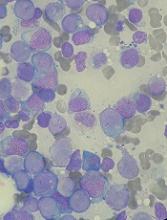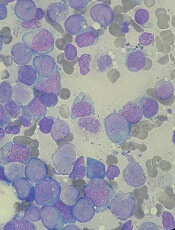User login
The US Food and Drug Administration (FDA) has granted orphan drug designation to ASLAN003 as a treatment for acute myeloid leukemia (AML).
ASLAN003 is a small molecule inhibitor of the human dihydroorotate dehydrogenase (DHODH) enzyme.
This second-generation DHODH inhibitor is being developed by ASLAN Pharmaceuticals.
The company is currently conducting a phase 2 trial (NCT03451084) of ASLAN003 in patients with newly diagnosed or relapsed/refractory AML.
The goals of this trial are to determine the optimum dose of ASLAN003 as monotherapy and assess the drug’s efficacy by overall complete remission rate. ASLAN expects to report interim data from this trial in the second half of this year.
ASLAN has already completed a phase 1 trial (NCT01992367) of ASLAN003 in healthy volunteers.
Results suggested that ASLAN003 has an “excellent” pharmacokinetic profile, according to ASLAN, and the drug was considered well tolerated in the volunteers.
ASLAN003 has also demonstrated “potent” inhibition of DHODH, according to ASLAN. In fact, the company said the binding affinity of ASLAN003 to DHODH has proven to be up to 2 orders of magnitude stronger than first-generation DHODH inhibitors such as leflunomide and teriflunomide.
ASLAN also said ASLAN003 should not confer the same toxicities as first-generation DHODH inhibitors and other novel AML therapies.
For example, leflunomide and teriflunomide, which may cause significant liver toxicity, take between 3 and 4 weeks to build to therapeutic levels and 2 years to be cleared completely after treatment is stopped.
ASLAN003, on the other hand, reaches full exposure in 24 hours and has a half-life of 18 hours.
Finally, ASLAN003 has been shown to differentiate blast cells into granulocytes in AML cell lines that do not respond to all-trans retinoic acid. These results were published in Cell in 2016.
Because of this research, ASLAN believes ASLAN003 may be effective in patients who do not respond to all-trans retinoic acid.
About orphan designation
The FDA grants orphan designation to products intended to treat, diagnose, or prevent diseases/disorders that affect fewer than 200,000 people in the US.
The designation provides incentives for sponsors to develop products for rare diseases. This may include tax credits toward the cost of clinical trials, prescription drug user fee waivers, and 7 years of market exclusivity if the product is approved.
The US Food and Drug Administration (FDA) has granted orphan drug designation to ASLAN003 as a treatment for acute myeloid leukemia (AML).
ASLAN003 is a small molecule inhibitor of the human dihydroorotate dehydrogenase (DHODH) enzyme.
This second-generation DHODH inhibitor is being developed by ASLAN Pharmaceuticals.
The company is currently conducting a phase 2 trial (NCT03451084) of ASLAN003 in patients with newly diagnosed or relapsed/refractory AML.
The goals of this trial are to determine the optimum dose of ASLAN003 as monotherapy and assess the drug’s efficacy by overall complete remission rate. ASLAN expects to report interim data from this trial in the second half of this year.
ASLAN has already completed a phase 1 trial (NCT01992367) of ASLAN003 in healthy volunteers.
Results suggested that ASLAN003 has an “excellent” pharmacokinetic profile, according to ASLAN, and the drug was considered well tolerated in the volunteers.
ASLAN003 has also demonstrated “potent” inhibition of DHODH, according to ASLAN. In fact, the company said the binding affinity of ASLAN003 to DHODH has proven to be up to 2 orders of magnitude stronger than first-generation DHODH inhibitors such as leflunomide and teriflunomide.
ASLAN also said ASLAN003 should not confer the same toxicities as first-generation DHODH inhibitors and other novel AML therapies.
For example, leflunomide and teriflunomide, which may cause significant liver toxicity, take between 3 and 4 weeks to build to therapeutic levels and 2 years to be cleared completely after treatment is stopped.
ASLAN003, on the other hand, reaches full exposure in 24 hours and has a half-life of 18 hours.
Finally, ASLAN003 has been shown to differentiate blast cells into granulocytes in AML cell lines that do not respond to all-trans retinoic acid. These results were published in Cell in 2016.
Because of this research, ASLAN believes ASLAN003 may be effective in patients who do not respond to all-trans retinoic acid.
About orphan designation
The FDA grants orphan designation to products intended to treat, diagnose, or prevent diseases/disorders that affect fewer than 200,000 people in the US.
The designation provides incentives for sponsors to develop products for rare diseases. This may include tax credits toward the cost of clinical trials, prescription drug user fee waivers, and 7 years of market exclusivity if the product is approved.
The US Food and Drug Administration (FDA) has granted orphan drug designation to ASLAN003 as a treatment for acute myeloid leukemia (AML).
ASLAN003 is a small molecule inhibitor of the human dihydroorotate dehydrogenase (DHODH) enzyme.
This second-generation DHODH inhibitor is being developed by ASLAN Pharmaceuticals.
The company is currently conducting a phase 2 trial (NCT03451084) of ASLAN003 in patients with newly diagnosed or relapsed/refractory AML.
The goals of this trial are to determine the optimum dose of ASLAN003 as monotherapy and assess the drug’s efficacy by overall complete remission rate. ASLAN expects to report interim data from this trial in the second half of this year.
ASLAN has already completed a phase 1 trial (NCT01992367) of ASLAN003 in healthy volunteers.
Results suggested that ASLAN003 has an “excellent” pharmacokinetic profile, according to ASLAN, and the drug was considered well tolerated in the volunteers.
ASLAN003 has also demonstrated “potent” inhibition of DHODH, according to ASLAN. In fact, the company said the binding affinity of ASLAN003 to DHODH has proven to be up to 2 orders of magnitude stronger than first-generation DHODH inhibitors such as leflunomide and teriflunomide.
ASLAN also said ASLAN003 should not confer the same toxicities as first-generation DHODH inhibitors and other novel AML therapies.
For example, leflunomide and teriflunomide, which may cause significant liver toxicity, take between 3 and 4 weeks to build to therapeutic levels and 2 years to be cleared completely after treatment is stopped.
ASLAN003, on the other hand, reaches full exposure in 24 hours and has a half-life of 18 hours.
Finally, ASLAN003 has been shown to differentiate blast cells into granulocytes in AML cell lines that do not respond to all-trans retinoic acid. These results were published in Cell in 2016.
Because of this research, ASLAN believes ASLAN003 may be effective in patients who do not respond to all-trans retinoic acid.
About orphan designation
The FDA grants orphan designation to products intended to treat, diagnose, or prevent diseases/disorders that affect fewer than 200,000 people in the US.
The designation provides incentives for sponsors to develop products for rare diseases. This may include tax credits toward the cost of clinical trials, prescription drug user fee waivers, and 7 years of market exclusivity if the product is approved.

